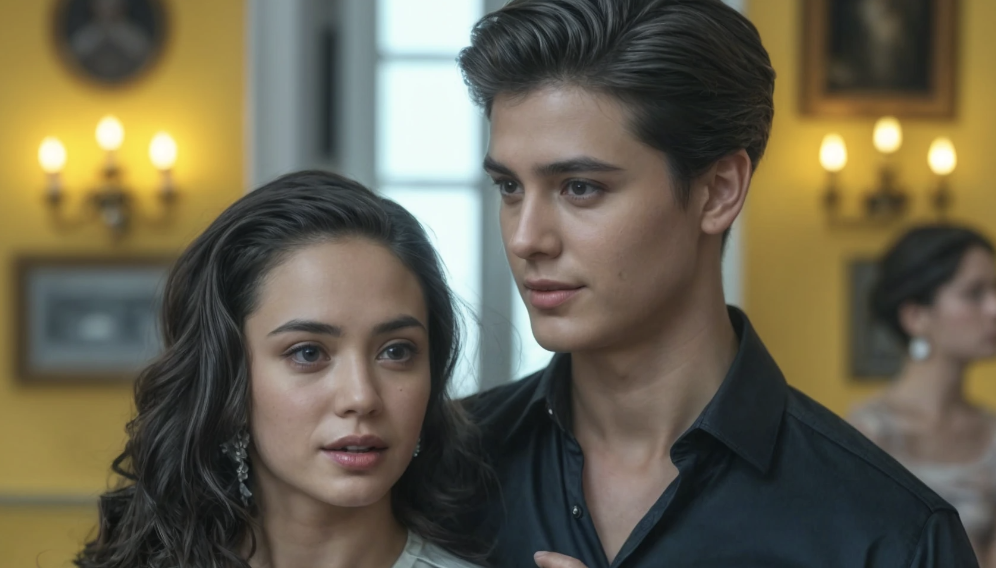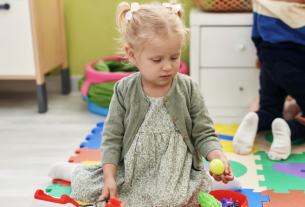Yana stood beside her husband and kept quiet. He was exactly as she had always seen him: grown, successful, already with two children. But he still couldn’t let go of that old grievance against his parents. She understood that it lived inside him like a scar that never healed. And no matter how hard he tried, he couldn’t forget it.
“Was it ‘humane’ when they kicked me out of the house because I didn’t pass my university exams? When I brought you to meet them and they looked at me like a stranger and said that a wife like you was just my level? Or when they gave my brother money for an apartment and me—nothing? Sure, very humane…”
Yana knew his relationship with his parents was… complicated. And she blamed his in-laws for it. How could you not, when the brothers were essentially the same, yet the treatment was different. Yes, Stas had been expelled, but no one even hinted to his brother Yaroslav that life has its hardships too. And as for Yaroslav’s wife… she had no quarrel with her at all. But Yana herself—she might as well have been a stranger.
And that house… God, how many conversations there were about how the money from selling the dacha could be split among them. Or not touched at all—left as is. But of course not. There was always someone ready to keep everything.
Yana drew a heavy breath but stayed by her husband’s side. She knew he was right, but she couldn’t quite understand why things had to be this way. Despite his bitterness, Stas himself felt it wasn’t right to completely cut ties with the people who had given him life. Because no matter how angry you are, parents aren’t just anybody. They can be gone—and then what?
Yana, after all, knew what she was talking about. Her father left when she was two. After that, nothing. He never came back. Her mother… her mother died when Yana was only twenty. She, like Stas, carried her own grievances. But with her mother it was more complicated. After her father left, her mother started drinking. Not like in books—she wasn’t sprawled under fences or abandoning her daughter to fend for herself. No. She would just often pour a glass of wine, knock it back, as if there was comfort in it. She would watch TV, curl up in a corner, and then go to bed.
But those moments stayed. Even now, Yana sometimes remembered how it was. She carried that resentment inside her. And yet she felt you had to forgive—not for them, but for yourself.
It seemed like nothing special. Her mother was a mother, only without alcohol she didn’t seem to know who she was. From childhood, Yana couldn’t stand the smell—especially in the evenings, when it hung in the air like a heavy curtain, ready to close the day. Her mother didn’t turn mean, no. It was just that when she drank, it was as if she went somewhere else and wasn’t the mother she could have been. Her attention was there, but somehow alien, as if for the sake of appearances. She cared, yet lived in a world of her own, where the television was the main pastime and the bottle was what helped her relax. No friends, no hobbies. A boring life, but her own.
When Yana grew older, she tried to fight it. She wanted her mother to stop and think at least once. But her mother was categorical: “Don’t tell me what to do. I know how to live my life. My life is my business. I’m not hurting anyone. Your life is fine, you have things to do.” And Yana understood it was better not to push. If she kept at it, things would only get worse.
So after school Yana moved away, far enough not to smell that stubborn reek of alcohol. Far enough not to remind herself of that house. Once she came home to visit, and her mother was at the table, asleep. An empty vodka bottle beside her. It was strange. She used to drink at least something more refined, and now… just vodka, with no snacks, nothing.
That’s when Yana firmly decided she would never set foot in that house again. She didn’t call. She was afraid of hearing a drunken voice, of getting upset. And then, like a bolt from the blue, the neighbor called. Her mother had died. A heart attack. Yana still blamed herself. Maybe if she’d stayed in touch just a little more, she would have noticed something, and maybe she could have saved her.
What was strange, though—people say children often repeat their parents’ fate, but in Yana’s case a stubborn hatred of alcohol took hold. She didn’t drink. And it was nice that Stas also drank very rarely, only on holidays. And now Stas’s milestone birthday was coming up. Thirty-five. Young, but already seasoned, with some achievements behind him.
Usually Stas didn’t like to celebrate his birthdays, but this time he wanted to. They booked a table at a restaurant, invited friends, his brother with his wife and child. But Stas didn’t want to invite his parents. Yana tried to persuade him. She was afraid it would finally ruin what was left of their relationship. But Stas was firm: “It’s my party, I want it the way I want.”
Yana didn’t argue. In the end, he was right—it was his day, and if that’s what he wanted, so be it.
The jubilee was beautiful. The whole family looked like they’d stepped off a glossy magazine cover. Even little Timoshka wore a bow tie and looked like a proper young gentleman.
At first everything seemed as usual: guests, gifts, laughter. But when Stas’s brother arrived, Yana immediately realized the evening wouldn’t pass without unpleasantness. His parents came with him, and it was instantly clear they were displeased. It was written on their faces; they didn’t try to hide it, even as they smiled.
“Well, Stas, didn’t tell your parents about the party?” Yaroslav drawled mockingly. “Forgot, did you?”
Yana had always found Yaroslav somewhat superficial, as if he didn’t quite grasp what he was doing, and perhaps for that reason his parents always nudged him along, did more for him. He drifted through things and didn’t delve into others’ feelings. Yana was sure he didn’t realize how delicate this moment could be. He simply didn’t think—he invited their parents without consulting his brother.
“Happy birthday, son,” said her mother-in-law, barely restraining her irritation. “I didn’t expect you wouldn’t invite us to your celebration.”
Yana felt everything inside her tense. She wanted to say something, to make something up to smooth it over. But Stas… Stas didn’t know how to do that. He was blunt, as always. And before Yana could think of anything, he said:
“Strange that you didn’t expect it. I invited the people I wanted to see. And I didn’t want to see you at my birthday.”
Everyone fell silent. Yana flushed and tried to distract the children, taking them aside to a corner, hoping they wouldn’t hear what came next.
“You’re saying that to your own parents?!” her father-in-law exclaimed, unable to believe his ears.
“Oh, now you remember I’m your son,” Stas snorted.
Something snapped in him. He had carried the weight of his grievances for a long time, but usually he knew how to keep it inside. Now the dam burst. Everything flew out—those old, ridiculous wounds that had sat in him since childhood. The money, the constant differences in how they treated their children.
Yana sat down at the table and lowered her head. It hurt. She so wanted this day to be different, for everything to go peacefully, for her husband to celebrate like normal people at least once instead of destroying everything around him. But here they were.
When his parents left in indignation, Stas came back to the table, tossed back a shot of cognac, and, scowling at the guests, said:
“Well, guys, go on—keep having fun.”
Only it wasn’t fun anymore.
What fun could there be, Yana thought, when this jubilee had started to look more like a wake than a party. Everyone shrank in on themselves, and the silence that lingered in the air after his parents’ departure stretched like a shadow. The guests gradually drifted away, leaving their family and Yaroslav with his wife and baby. Sit or don’t sit—either way the atmosphere was such that the celebration was over.
“You really outdid yourself,” Yaroslav’s wife sniffed. “What kind of words are those to say to your own parents? Sorry, Stas, but you’re a real bastard.”
Yana couldn’t hold back. That woman—with her tone and brazen air—was the last person who should be making judgments. Sit quietly, say nothing—no one asked you.
“That’s none of your business,” Yana snapped. “Stay out of it.”
The woman snorted, smirked at the corner of her mouth, and turned to her husband.
“Yarik, let’s go home. Looks like we’re not welcome here either.”
Yaroslav seemed not to hear his wife. He looked at his brother with something like confusion, or maybe sadness, annoyance. Perhaps he never fully realized how much their parents had divided the two of them. For him it had always felt natural. He didn’t know what it meant not to be loved, what it meant to fight for attention. In his world, things were simple.
“Stas, I’m sorry if I did something wrong,” Yaroslav said, his gaze hanging on his brother. “I’ll give you half of that money.”
His wife stared at him in speechless horror. She looked at her husband like he was insane.
“Where are you going to get it?! Are you completely out of your mind?!”
Yaroslav shook his head evenly.
“Be quiet,” he said curtly.
Stas sank into his chair with relief, pulled a salad toward him, and prodded it with his fork.
“Forget it,” he said softly without looking up. “This isn’t on you. And I don’t need the money. That’s not the point. I’ve been thinking—so much time I’ve spent… always trying to get something from them. For them to be proud of me, proud of my family. And what for?” He flicked his hand, his gaze still dark. “They even split the grandkids. With your son, there’s never a problem—they’ll take him to the seaside, they’ll come to see him anytime. Mine? Maybe once a year, and even then with sour faces.”
He fell silent. The room grew completely quiet. Stas leaned back in his chair and stared at a single spot. Yana said nothing. I’m silent, he’s silent, she’s silent. Everyone was silent.
Yana embraced Stas, pulling him as close as she could. In that moment she would have gladly taken all his pain onto herself to lighten the load, but she knew she couldn’t. She could say so much to encourage him, but all those words had already been said, and it seemed they changed nothing. Stas needed to accept a simple truth: for some reason his parents loved Yaroslav more, and perhaps he should leave it outside the brackets, not obsess over it. Life would set its own accents anyway.
After that evening, Stas’s relationship with his parents went downhill. They all became strangers. His father called and said they had made a will—everything would go to the one who knew how to be grateful. Not to Stas. Yana didn’t even have time to look at her husband—he only gave a quiet snort. It had always been that way. What other reaction could there be?
She tried to stand by him, to support him, to help him learn to live with it, to work through the resentment, to forgive his parents. But it only happened many years later, when Stas’s father became seriously ill. The same father he hadn’t spoken to in over three years. And everything Stas learned about the illness came from Yaroslav.
Then Stas suddenly understood that he had lost a lot, while having everything that truly mattered. He had Yana—loving and caring. He had children, and both of them were wonderful. He would never again allow himself to treat them differently. And that was a true revelation.
So he found the courage and went to his father. His father really did look bad. Stas could see at once: there wasn’t much time left.
His mother had grown old; her face was quietly sagging. When she opened the door, Stas felt unbearable pity. He was afraid she wouldn’t accept him, wouldn’t even let him say goodbye to his father, but to his surprise she hugged him and broke down in tears.
They talked for a long time, as if those years of silence had never happened, as if the resentment didn’t exist. Stas told them about the grandchildren, and his father asked to see them. But he didn’t make it. After Stas left, he died. That very night.
At the funeral Stas told Yana that perhaps the best gift we’re given in life is forgiveness.
“You know,” he said, “the burden I carried for so many years just vanished. Resentment—it eats you from the inside, it keeps you from enjoying life. I’m glad I found the strength to forgive and managed to say goodbye to my father. And you… it’s time you forgave yourself too—stop blaming yourself for not talking to your mother.”
Yana smiled sadly and leaned into her husband. He was right. Resentment is poison. And those who learn to live without it become truly happy people.
Several years passed. Stas and Yana often spoke about the day he forgave his parents. Each time the topic came up, Stas seemed to relive it all and feel the lightness again. He noticed he had changed—not because the world around him had changed, but because that heavy knot pressing on his chest was gone.
One evening over dinner, Yana cautiously asked:
“Do you ever regret that you stopped fighting for their love?”
Stas thought for a moment. He looked at Yana’s calm face and realized that all these years she had been his quiet anchor.
“No,” he said. “Maybe they just couldn’t love me the way I wanted. That was their right. But now I see I did myself far more harm than they ever could. If not for that resentment, maybe I would’ve figured out sooner what truly matters—the ones beside me. You, the kids. All of it. I’m glad I got there in time.”
Yana nodded, then gently asked:
“And what would you say to them if they were here now?”
Stas smiled. He’d been thinking more and more about how hard it can be to talk to people you haven’t seen in a long time. No matter how difficult, there’s always a way to find the words.
“I’d simply say that I forgave them. But not for them—for myself. So I wouldn’t have to carry that weight anymore.”
Yana touched his hand. It was a joy to see her husband change. Not for someone else, but for himself. And that was the first step toward true freedom.
Stas looked at Yana, at their children, and then, unable to hold back a smile, said:
“And I’d add that I’m happy. I think that matters too—to tell people that you’re happy.”
Yana laughed, and in that moment Stas realized he truly was happy. Not in trying to be harmlessly good for everyone, but in finding peace within himself.



